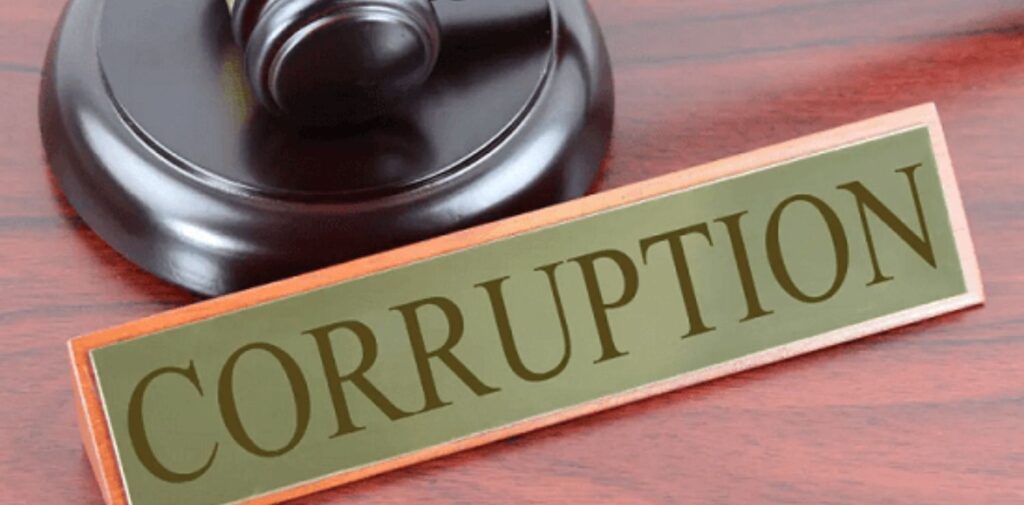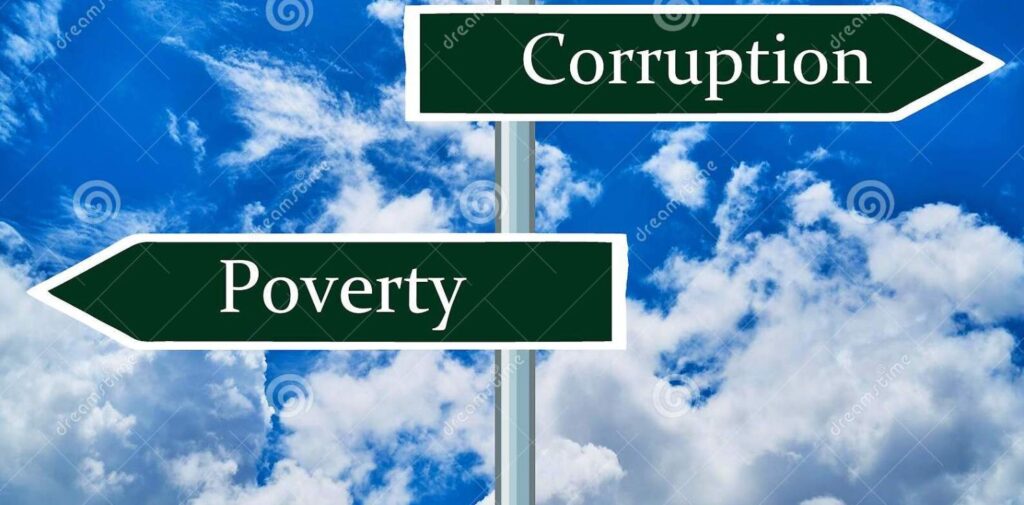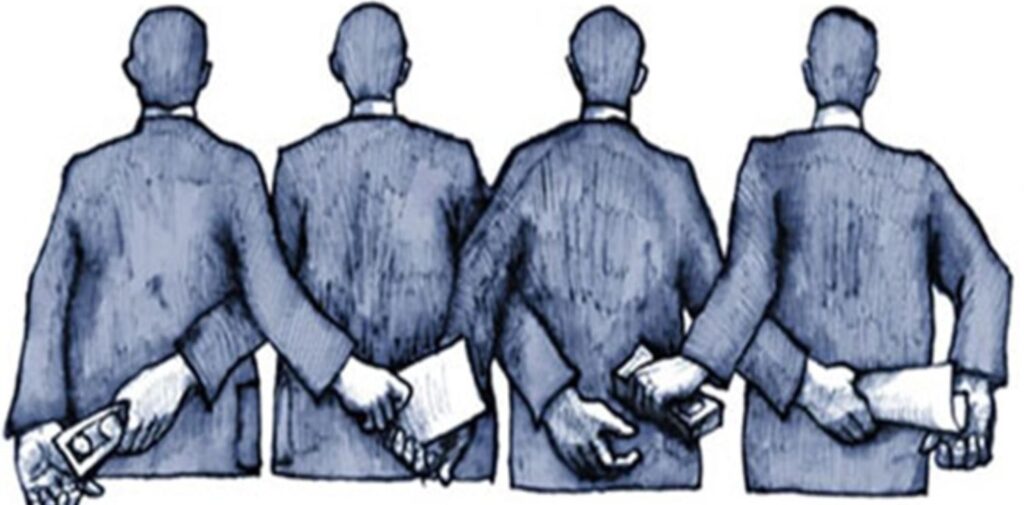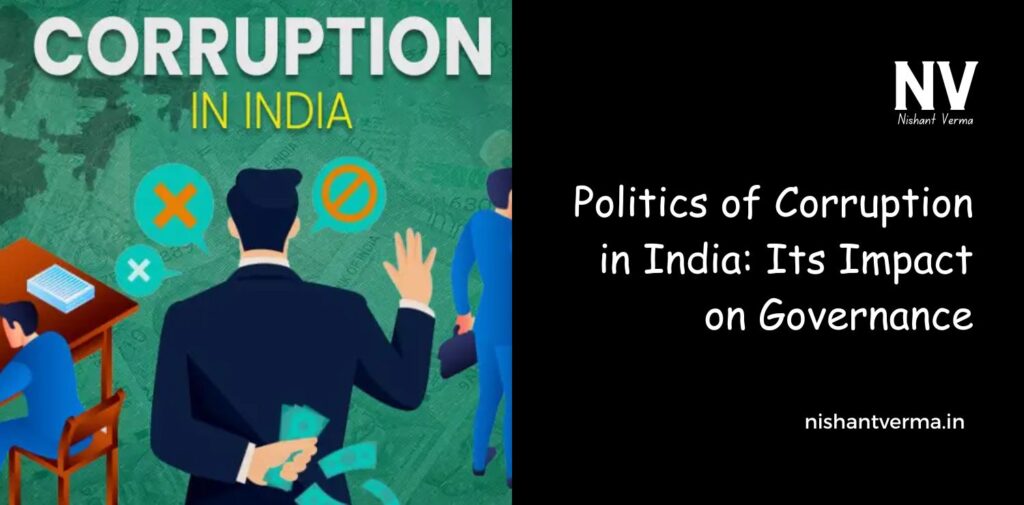India is a large country with a rich history, diverse cultures, and a rapidly growing economy. But like many countries, India also faces a big challenge: corruption. Corruption is when people in power, such as politicians, government officers, or business leaders, use their positions for personal gain, often at the cost of the public. This has been a problem in India for many years, and it affects the country in many ways. In this article, we will talk about what it is, how it has impacted India’s politics and governance, and how it affects the lives of ordinary citizens.
What is Corruption?
Corruption happens when people in power use their authority to get money, favors, or advantages illegally or unfairly. This can include bribing officials to get a job, giving money in exchange for contracts, or using public funds for personal gain. It can take many forms, like cheating in elections, accepting bribes, or misusing government resources.
In India, corruption has been a problem in both small and big ways. It can happen at any level of government, from the local level to the highest offices. This affects not just the government but also businesses, schools, hospitals, and even daily life. When corruption takes place, it harms the country’s development and makes life difficult for ordinary people.

How Does Corruption Affect Governance?
Governance refers to how a country is governed and how decisions are made. It has a huge impact on governance in India. When leaders or officials are corrupt, they do not work in the best interest of the people. Instead of focusing on improving schools, hospitals, roads, and other services, they focus on making money for themselves. This leads to poor decision-making, delays in projects, and a lack of basic services for the people.
It also weakens the trust that people have in their government. When citizens see that leaders are taking bribes or misusing power, they lose faith in the system. This means that they might not follow the rules, pay taxes, or participate in elections. This can make the country’s democracy weaker and affect how well the government works.
The Impact of Corruption on the Economy
Corruption has a very negative effect on the economy of India. When government officials take bribes or give out contracts unfairly, the money that should go into building infrastructure, improving education, or providing healthcare gets wasted. This slows down the country’s progress. For example, if a construction company bribes officials to get a contract for building a road, they might cut corners and use bad materials. This could lead to roads that are unsafe and expensive to repair.
It also makes it difficult for honest businesses to thrive. If businesses have to pay bribes to government officials to get licenses or clearances, it adds extra costs. This can discourage people from starting new businesses, which in turn reduces job opportunities and slows down economic growth.
In addition, foreign investors may be hesitant to invest in India if they know that corruption is a big problem. They may worry that they will have to pay bribes or deal with dishonest officials. This can make it harder for the country to attract the investment needed for development.
Corruption in Elections
Elections are the backbone of democracy. In India, elections are held to choose leaders at different levels of government. However, It also plays a role in elections. Some politicians use illegal methods like bribing voters, manipulating results, or misusing government resources to win elections. This can make elections unfair and prevent honest leaders from being chosen.
When elections are not free and fair, it harms democracy. Corrupt politicians who win elections through dishonest means may not have the people’s best interests at heart. Instead, they focus on protecting their own wealth and power, leaving the country’s problems unsolved. This weakens the system of democracy and makes it harder for the government to serve the people properly.

Corruption and Poverty
It also has a direct impact on poverty in India. India is home to millions of poor people who struggle to meet their basic needs. Corruption in government programs that are meant to help these people can make the situation worse. For example, if money meant for food, healthcare, or housing is stolen or misused by officials, it does not reach the people who need it most. As a result, poor people remain without the help they deserve.
Many government schemes are designed to help those in need, such as providing affordable food or health services. But corruption can divert funds from these schemes, leaving the poor with little support. This creates more inequality in society and makes it harder for the country to tackle poverty effectively.
The Role of Political Parties
Political parties play a big role in India’s governance. Some political parties may try to tackle corruption by implementing anti-corruption laws or promoting transparency. However, at times, political parties themselves become involved in corruption. Politicians may use their power to protect corrupt practices, or they may cover up the wrongdoings of their colleagues.
There have been instances where political parties have promised to fight It during election campaigns but failed to act once they come into power. This makes it difficult for citizens to trust political leaders and believe that the government will truly work for the people.
Sometimes, corruption is used by political parties to gain votes. For example, they may offer money or gifts to people in exchange for their votes. This kind of practice distorts the electoral process and reduces the chances of fair elections. In the long run, it damages the country’s democracy and undermines the rule of law.
The Fight Against Corruption
Despite the challenges, there have been many efforts to fight corruption in India. Over the years, several anti-corruption movements and organizations have worked hard to expose corruption and demand action. One of the most famous movements was the Jan Lokpal movement led by Anna Hazare in 2011. This movement called for the creation of an independent body (the Lokpal) to investigate corruption in government offices.
The government has also passed laws like the Right to Information Act (RTI), which allows citizens to access information about government activities. This helps people hold the government accountable and makes it more difficult for officials to hide their corrupt actions. In recent years, some states have also set up anti-corruption bodies to investigate complaints and take action against corrupt officials.
However, the fight against corruption is far from over. Many corrupt practices still exist, and it remains a challenge for India’s political and governance systems to eliminate them completely. People must continue to demand transparency, accountability, and better laws to protect public resources and prevent corruption from spreading.

The Role of Citizens in the Fight Against Corruption
While the government and political leaders have an important role in fighting corruption, citizens also play a key role. Ordinary people can help by reporting corruption when they see it. They can also support political candidates who are committed to transparency and honesty. Participating in anti-corruption movements and campaigns can also make a big difference.
It is important for every citizen to understand that corruption is harmful not just for the country but also for themselves. When people refuse to pay bribes and stand up against It, they help create a culture of integrity and honesty. This is crucial for improving governance and ensuring a better future for India.
Conclusion
It is one of the biggest challenges facing India today. It affects almost every part of life – from the economy to education, healthcare, and elections. Corruption weakens governance, increases poverty, and damages the trust people have in their leaders. However, with continuous efforts by the government, civil society, and citizens, it is possible to reduce corruption and improve the political system.
The fight against It will take time, but it is important for everyone to work together to build a fairer, more transparent society. By holding leaders accountable, demanding better laws, and not tolerating It in everyday life, India can take steps towards a brighter future, where the government works for the people and not for personal gain.




